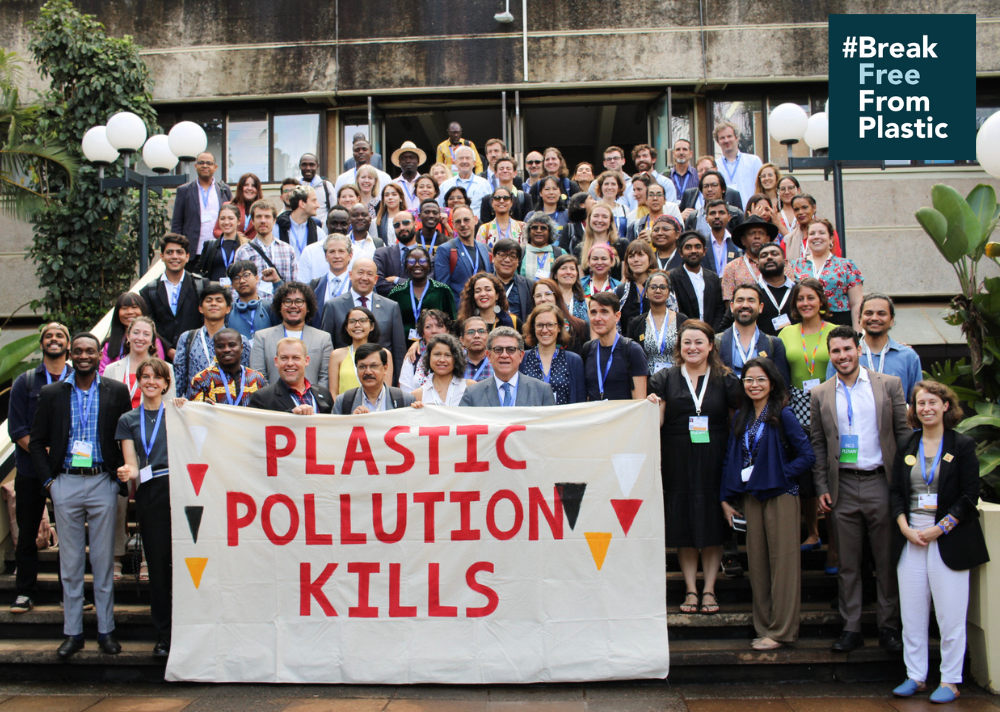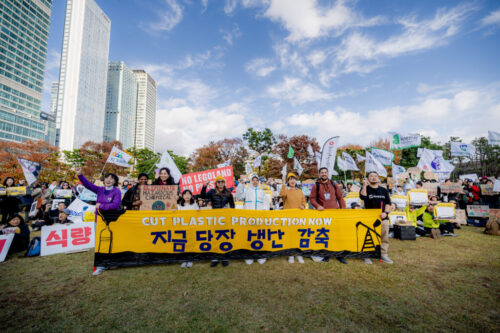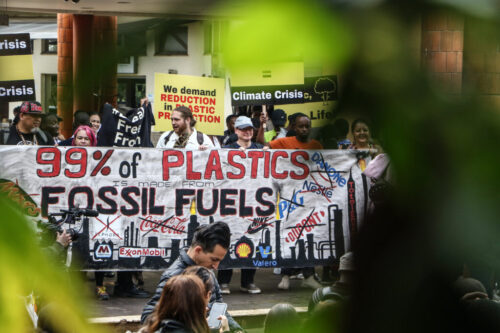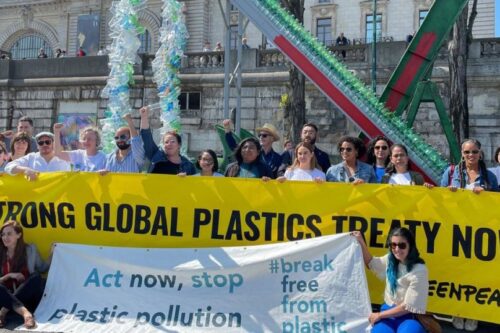From BFFP Comms Hub, “Petrochemical Interests Jeopardize Plastics Treaty Negotiations”, November 20th, 2023
In March 2022, the world made the historic decision to develop a legally binding treaty on plastic pollution that addresses the full lifecycle of plastic, including its production, design and disposal. The goal was to complete treaty negotiations by the end of 2024.
The Intergovernmental Negotiating Committee meeting (INC-3) held in Nairobi, in November 2023, marked the midway point of the process. The meeting’s final outcome has been reported as a disappointment due to the delay tactics demonstrated by a few oil and plastic producing countries. However, there were also significant displays of ambition that took place throughout the meeting by many delegates. Many of these countries are rising up to the extraordinary opportunity to develop a treaty that covers the full lifecycle of plastics.
Days ahead of the meeting, 60+ countries of the High Ambition Coalition to End Plastic Pollution issued a joint statement reiterating the need for the treaty to reduce plastic consumption and production – turning off the single-use plastics tap for good. During the negotiations, many countries from the African Group and the Pacific Small Island Developing States championed ambitious provisions to: reduce plastic production and pollution, to eliminate and restrict toxic chemicals, and protect human rights. Other countries, like Uruguay and Brazil, advocated for the rights of waste pickers and the inclusion of a just transition in the treaty. A growing number of countries across the different regions also called for a treaty that protects human health. There were also important new displays of transparency, with the Regional Meeting of the Asia Pacific opened up for the first time to observers- allowing observers to better understand positions within the region, adding to the other regional groups who have historically been open.
In and out of the meeting, the world heard calls for a strong ambitious treaty from civil society members of the Break Free From Plastic (BFFP) movement, who also exposed some of the flawed solutions being promoted like plastic credits and plastic neutrality. BFFP, together with local climate groups, marched through the streets of Nairobi, calling for a drastic reduction in plastic production. Other NGOs focused on reuse demonstrated how an effective treaty can help scale up reuse as a solution to plastics. They illustrated successful reuse pilot projects underway from cities in Europe to Asia.
These groups also raised the alarm about the outsized influence of the fossil fuel and chemical industry at the meeting demonstrating the need for a conflict of interest policy. A report by the Center for International Environmental Law documented that the plastics industry had 143 lobbyists at the negotiations, more than 70 countries combined and four-times greater than the number of participants representing the Scientists’ Coalition for an Effective Plastic Treaty.
Yet, despite the displays of hope at the meeting, it’s also true that an emerging alliance of a few ‘like-minded’ oil-producing countries, including Saudi Arabia, Iran and Russia derailed the negotiations through procedural maneuvering. These plastic producing countries are pushing against regulation in favor of “voluntary commitments” and are aiming to narrow the scope towards recycling and downstream waste management, excluding plastic production reduction measures from the treaty. This is far from the scientifically preferred approach of stopping the problem upstream, before it begins. As a result, the meeting concluded with a heavily bloated Zero Draft text that that will become the basis of future negotiations and no agreement over future intersessional work or a mandate for a first draft before INC-4, thereby delaying important technical work that could help inform and shape future discussions.
Far too much is at stake if the treaty negotiations fail to live up to the original vision. The rapid production and consumption of single-use plastic is already pushing our planetary boundaries and worsening the crises of climate change and biodiversity/habitat loss. The rare opportunity for an ambitious legally binding treaty to address the plastic crisis underscores the need for concerted global action. This is why the Plastic Solutions Fund invests in the power of people at the fencelines of the petrochemical industry and those impacted by waste trade, along with the BFFP movement that has more than 3,000 civil society organizations worldwide. Together, these groups envision a future free of plastic pollution and are calling upon leaders to safeguard human and environmental health with a global plastics treaty that limits plastic production first and foremost.
With only a year to go, it’s imperative that all the countries willing to negotiate in good faith for a legally binding plastics treaty stand up to the influence of the fossil fuel countries and companies by reiterating their shared commitment to address the lifecycle of plastics.
We hope that Ambassador Luis Vayas Valdivieso (Ecuador) who will be the new Chair at INC-4, comes prepared to take measures against the corporate capture and the procedural maneuvering that characterized the INC-3 negotiations.
By: Ame Trandem, Program Manager for Europe at the Plastic Solutions Fund




